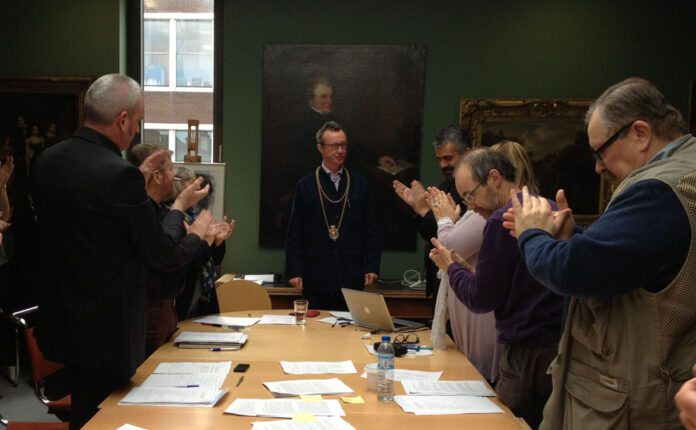ENNIS-born artist, Mick O’Dea has been elected the 23rd president of the 193-year-old Royal Hibernian Academy (RHA).
Mick’s election was confirmed at the annual general meeting of the RHA at Ely Place, Dublin, on Tuesday, and he takes over from architect Des McMahon, the designer of Glór in Ennis, among many other noted buildings including Croke Park, for a term which can vary but is usually five years.
“There was an election, there was a number of candidates and I was successful,” the 58-year-old celebrated landscape, portrait and historical painter, who is also a member of Aosdána, told The Clare Champion.
“I’m very proud to represent the RHA, a diverse selection of outstandingly talented people. That’s the biggest honour of all really.
“It’s humbling. A lot of the members are, in my eyes, venerable people who have been practicing their arts through thick and thin for all their lives, into their eighties,” the newly elected president said, adding, “They were there today and they gave me the thumbs up and I was humbled by that”.
It has been a year of highs and lows for the Ennis man, starting with a serious accident last January while cycling, after a pedestrian walked out in front of him on Dublin’s O’Connell street. Mick was thrown from the bike and landed on his back. He was rushed to the Mater Hospital and spent four days in ICU.
“I lost four pints of blood internally and I ended up losing my spleen. I’ve improved a lot but I still have a fair bit to go. I was lucky, in a way. I started exercising a couple of months ago, swimming in the sea and that’s kind of building me up again. I’m still a bit underweight but, by and large, I feel my strength coming back. It made me take stock of what to prioritise, to take advantage of and to use the time available to me,” he said.
The RHA is made up of 30 members, 15 senior members and 10 associate members, all of whom are professional artists. The disciplines of architecture, painting, sculpture and print, including photography, are all represented by the academy’s broad national membership.
“I have been involved with the academy over many years. I was elected as an associate member in 1993 and a full member in 1996. I’ve been involved in a number of capacities, as treasurer, as school principal and I’ve been working on various committees. I like the idea of an artists’ organisation. Other organisations fell by the wayside and a lot of that had to do with, I think, not having a charter or a premises,” he said.
Mick expects to be a very hands-on RHA president for the term. “We’ve got the centenary of the Rising coming up in 2016 and the interesting thing, from our point of view, is the RHA building on Abbey Street was destroyed in a fire at the time. It was the biggest cultural loss of the time. It was in the middle of the action and the medal that I was presented with as a symbol of my office, that and the Charter, were the only things that survived the fire. The Keeper managed to leave the burning building with those two things.
“I see my role is trying to get the RHA through another few difficult years ahead, financially, and trying to ensure that the bank’s payments are being met. But also to realise the RHA’s potential at the centre of Irish cultural life, particularly in the visual arts,” he said.
He credits his life as an artist to a busy childhood spent between the family’s bar and shop on O’Connell Street in Ennis and the family farm in Lisheen, the encouragement he received in Ennis Primary School and St Flannan’s, where, he says, “the conditions weren’t adverse to me developing my talent” and that of his family, of whom only brother, John, remains at home in in Ennis.
“I’d also credit three other very important people in my life. My sister, Clare, who lives in Limerick, is a choreographer and a yoga teacher; my sister, Mary in Galway, a recently retired nurse and my sister, Anne in California, a librarian and broadcaster at KMVR independent radio station.
On Thursday evening , there was another important event in his career at the Kevin Kavanagh Gallery in Chancery Place, Dublin, with the opening of Mick’s exhibition, The Split.
This is the final piece in a trio of exhibitions on the historical themes explored in Black and Tan (2010) and Trouble (2012). He has produced large-scale paintings that draw on a wide range of photographic sources. In conjunction with the exhibition, Kevin Kavanagh has produced and published a fully illustrated book on the artist, featuring work from all three exhibitions.
Ron Kirwan
A native of Ennis, Colin McGann has been editor of The Clare Champion since August 2020. Former editor of The Clare People, he is a journalism and communications graduate of Dublin Institute of Technology.



